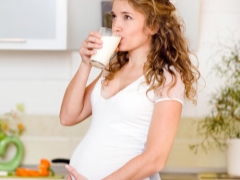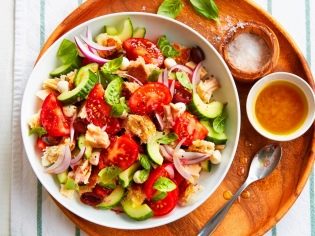Why is a protein diet prescribed for pregnant women and how to follow it?
Proper nutrition during pregnancy plays a crucial role in the development of the baby and the well-being of the future mother. It is often possible to hear that doctors prescribe a protein diet during the period of gestation. Why this is done, how to observe such a diet, we will tell in this article.
What it is?
Protein diet is not a specific diet with strict recommendations, it is a large list of various dietary patterns, a common feature of which is the predominance of proteins in the diet. At the same time, the amount of fats and carbohydrates is artificially reduced. The most famous protein diets include the popular Atkins diet, "kremlevku", but as you know, these diets have nothing to do with the diet of pregnant women.
The protein diet is very simple in nature - it only limits unwanted foods, and the recommended ones can be consumed until saturation - the future mom will definitely not have to starve.
Proteins themselves are not stored in the body, and this is their main difference from fats and even carbohydrate compounds. For the full development of the baby in the womb during pregnancy it is very important to ensure a constant replenishment of proteins with meals. They are necessary for the proper metabolism of the future mother and her baby. Proteins are important as a “building material” for the crumbs. For this reason, pregnant women are categorically contraindicated vegetarian food, which can not provide the required amount of animal protein. Lack of proteins for pregnant women is fraught with metabolic disorders, and for the baby - low weight and slow rates of subcutaneous fat accumulation.
Most obstetrician-gynecologists believe that women in general and pregnant women in particular, are noticeably short of protein. That is why they are recommended protein diet. For those who wish to conceive a child, such nutrition helps to increase fertility, and for those who wish to carry a healthy baby, it helps to achieve this goal.
Protein diet for pregnant women is different from the mass of other protein diets. The main difference is that expectant mothers are allowed and even strongly recommended to eat not only proteins, but also fiber, a certain amount of carbohydrates and fats. The best option is the protein-vegetable diet, in which most of the diet is meat, fish, poultry and vegetables, greens, and fruits.
Who is recommended?
In fact, the protein diet is recommended for all pregnant women without exception, and from the earliest terms of gestation. It allows you to gorge without overeating, as well as to control weight gain. The increase should be closely monitored, because too much can result in severe late toxicosis, placental abruption, fetal death, as well as significant difficulties in childbirth.
But first of all, the protein diet is recommended for women who, before the onset of pregnancy, had obesity problems, expectant mothers, who have already begun to sort out kilos. This food allows you to slightly reduce the "excess" even in the process of carrying a baby without any harm to his health.In the third trimester of pregnancy, when the risk of anemia is increased, it is also useful to resort to a protein diet for all categories of expectant mothers. Such a diet is recommended for women who are carrying twins, as well as women who were able to become pregnant through in vitro fertilization (IVF).
With the threat of miscarriage, slow growth of the fetus, delayed development, some pathologies of the placenta, doctors strongly recommend a protein-vegetable diet. Also, this food is recommended for women who are carrying a large fruit.
Principles of nutrition
If the doctor advised during pregnancy to follow a protein diet, you should not prepare yourself for the terrible trials of hunger and deprivation. Protein diet is a sparing option of healthy and proper nutrition, in which a woman does not have to limit herself to everything without exception.
It can eat carbohydrates, however, replacing fast carbohydrates (cakes, sugar) with slow ones (cereals, bread). Carbohydrates should be included in the morning and lunch meals. In the afternoon it is better to do without them.
The need for proteins is higher in the second trimester and in the last third of the gestation period. AT first trimester the daily rate of their consumption is set at 70-80 grams. From the second half of pregnancy, this amount should be increased to 120-130 grams per day.
Meals should be fractional, the expectant mother should eat 5-6 times a day, but the volume of servings should be reduced. For two people, there is a fundamentally wrong approach, which will only lead to the accumulation of extra pounds that are completely unnecessary and complicate the carrying of the little one.
Eating on the principles of the protein diet, a woman must remember to have the correct drinking regimen. Drink about one and a half liters of liquid. Clean non-carbonated drinking water (not mineral water!), Green tea, homemade fruit juice, sugar-free compote will do. Carbonated drinks, store juices - under the ban.
It is best to make yourself a menu for every day, for a week and even for a month. This will help better plan your meals and, if necessary, make adjustments to it. Take into account the number of proteins special tables. We are ready to provide one of them for your use.
Women who have already experienced a pathological weight gain, have signs of preeclampsia, should follow the salt-free version of the protein diet, the rest is allowed to consume no more than five grams of salt per day.
The main volume of food should be consumed before lunch and at lunch, making dinner easier, and the second dinner - completely “weightless”, so as not to go to bed with a full stomach and a huge body need to digest everything eaten before bedtime, to the detriment of normal rest.
Prohibited and permitted products
In order to plan meals in accordance with the principles of a protein diet, it is necessary to understand well which foods should be in the diet and which foods should be avoided. The list of prohibited products is as follows:
- semi-finished products (contain a lot of preservatives and soy);
- food from the area of fast food (rich in dyes and preservatives, as well as fats);
- shortbread and pastry (rich in fast carbohydrates);
- sweets (cakes, pastries, chocolates - a source of carbohydrates);
- mayonnaise, ketchup and other sauces and dressings (contain dyes and preservatives, fats, “whet” irrepressible appetite);
- mushrooms;
- canned products (this also applies to canned meat and fish, and canned vegetables, salads, lecho);
- coffee, strong black tea;
- grapes and bananas (too sweet).
Now, freeing the refrigerator from the harmful and unnecessary, let's proceed to the formation of a list of useful and necessary products, on which the nutrition of the future mommy will be built. When following a protein diet, you need:
- low-fat fish (except herring, mackerel);
- veal;
- beef (first and second category);
- pork (lean parts, such as ham);
- any chicken and turkey meat;
- seafood (in the absence of allergy to them);
- milk and dairy products (not more than half a liter per day);
- cereals (except for manna, pearl barley, rice);
- fresh (raw) vegetables and fruits (potatoes - limited);
- nuts (in small quantities and only in the absence of allergy to them);
- berries.
It is clear that nine months to withstand a certain diet is quite difficult from a psychological point of view. Therefore, sometimes when it becomes completely unbearable, the expectant mother can eat a piece of marshmallow or marshmallow, a small portion of ice cream (only high-quality, without vegetable fat), honey and jam (homemade and in small quantities).
Contraindications
Protein diet is not recommended for expectant mothers with chronic bowel and stomach diseases. Caution should be taken to such nutrition in women who have kidney disease.
It is strictly forbidden food with an abundance of protein foods for women with heart disease. Also, do not build your diet on the predominance of proteins for women with a deficiency of body weight and too little weight gain at the current moment of gestational age.
Before starting a diet with a predominance of protein and plant foods, you should always consult with your doctor. It is possible that such a diet will not only help you, but also cause significant harm to health.
General recommendations
At first, it may seem to future mothers that the list of permitted products is too small and the diet will be scanty and monotonous. It's a delusion. Protein diet for pregnant women, of course, has its limitations, but not to such an extent that you can feel the lack of diversity.
In drawing up the menu, it should be noted that all permitted products are best prepared in a certain way, which will preserve the structure of the protein. Frying in oil, for example, destroys it, and besides, the fried steak is saturated with fats, which is absolutely not necessary. Therefore, meat products and vegetables can be boiled, baked, stewed. But you should not fry. However, this prohibition is not very restrictive, because of the above products you can cook anything - meatballs, baked steaks, steam cutlets, steamed and baked fish dishes, soups.
Vegetables preferably eat raw. Salads are welcome, but with vegetable oil you need to be more moderate, and spices should be avoided altogether. Milk is required every day. If there is milk intolerance (which is not such a rarity among the adult population of the planet), you can breed and drink baby or protein mixtures if the doctor approves of them.
It will be optimal if a woman receives recommendations from a nutritionist who takes into account her individual characteristics - age, height, weight, percentage of fat and muscle mass, gestational age, comorbidities. This will allow you to get an individual menu.
All necessary substances should be included in each meal. This is the main principle of balanced nutrition. In other words, a woman should have proteins, a limited amount of carbohydrates, fats in breakfast, in lunch and in dinner. An example of a good and balanced meal looks like this:
- fresh cucumber and tomato salad, seasoned with half a teaspoon of vegetable oil - 150 grams;
- vegetable soup with meatballs (100 grams);
- steak of pink salmon, steamed (100 grams);
- boiled buckwheat without oil (60 grams);
- an Apple.
During snacking (between breakfast and lunch, between afternoon tea and dinner, after dinner) it is better to be limited to one product - it can be fruit or yogurt, cottage cheese.
30% of daily calories should fall at the very first morning meal, 10% at lunch, 40% at lunch, 10% at lunch and as much at dinner. The total calories per day for a pregnant woman can be different, it is recommended individually, taking into account many factors. On average, it is 1900-2200 Kcal.
Reviews
Many women who tried to follow a protein diet while carrying a fetus say that it is rather difficult to restrain oneself from eating prohibited foods, especially at the very beginning and at the end of pregnancy. The situation is aggravated by maternity leave. A woman becomes more free, she has time to rest, and at this time for some reason it becomes unbearable from the thought that lying on the couch, you can not afford a couple of chocolates and ice cream.
Many say that with the transition to a protein-vegetable diet, the state of health improves significantly, even the signs of toxicosis, if they were, become more “smoothed”, less pronounced. For many, it is this approach to nutrition that helps overcome the first and most difficult trimester of pregnancy.
Many people point out one big drawback - the relative high cost of authorized products. Good veal, fish, high-quality dairy products, cheeses are quite expensive, and the new diet can significantly affect the family budget. However, on the other side of the scale is the health of the baby, and usually the cost of good and quality products from the approved list does not stop women.
Practically all pregnant women, this diet helped to “keep” a normal weight gain, which later greatly facilitated the task of bringing oneself into shape after giving birth.
On how to eat during pregnancy, see the following video.


























